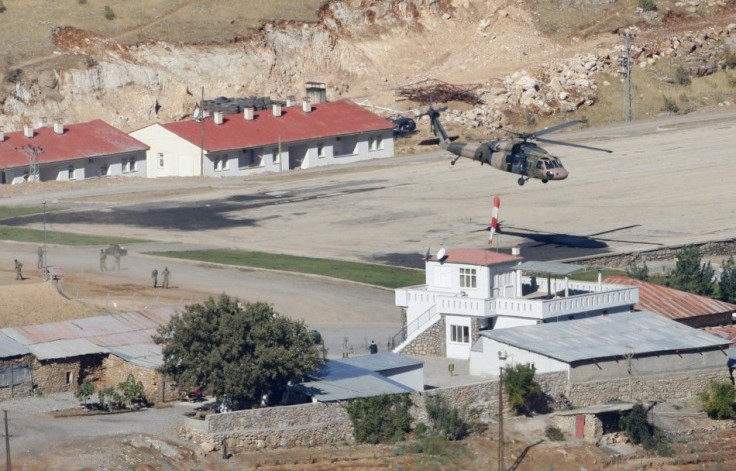Turkey Launches Assault on Kurdish Militants, but New Constitution Could be Solution to Conflict

As the Turkish military launches a broad retaliatory campaign against the militant Kurdish Workers' Party, or the PKK, a parliamentary commission is beginning to draft a new constitution that could expand minority rights and settle some longstanding Kurdish grievances.
The timing underscores the divergent ways forward for a Kurdish minority that has endured decades of discrimination and political repression. The Turkish army is responding to a PKK attack that left 24 Turkish soldiers dead, one of the deadliest single attacks in the long conflict between the PKK and the government and part of a renewed barrage of PKK assaults. The surge in violence is occuring against the backdrop of electoral victories by a the pro-Kurdish Peace and Democracy Party, the constitutional rewrite and the government initiating a so-called Kurdish Opening to respond to some Kurdish demands.
Even with what the Turkish government has done, they've made some reforms but they were not satisfying for most Kurdish people, said Güne? Murat Tezcür, an associate professor of political science at Loyola University in Chicago. From the perspective of both the insurgents and the activists the question is how do we get these concessions? Should we opt for legal methods or armed action?
Kurds Have Long Faced Restrictions in Turkey
Kurds comprise nearly one-fifth of Turkey's population but they have long faced restrictions on their freedom. Enacted in 1982, Turkey's current constitution established a highly centralized government, constrained Kurdish political activity and enshrined a conception of citizenship that is closely tied to Turkish ethnicity. The PKK -- which the United States, the European Union and Turkey have labeled a terrorist organization -- waged a brutal insurgency in the 1980's that left more than 37,000 dead, most of them Kurds. The government responded by invoking a draconian state of emergency that led to thousands of villages being evacuated and widespread killings and torture.
Since the emergency law was officially lifted in November of 2002 the government has made halting progress in instituting reforms, most recently under the Kurdish Opening spearheaded by Prime Minister Recep Tayyip Erdo?an, that have included expanding Turkish language television broadcasts and permitting political speeches in Kurdish. The role of the Kurdish language in civic life remains a highly contentious issue, and the government has resisted demands to allow schools in Kurdish municipalities to teach and print textbooks in Kurdish.
Other obstacles to reconciliation remain. Authorities have arrested hundreds of Kurdish nationalists, including mayors and other local elected officials, on the basis of alleged ties to the PKK. The government offered the same argument after arresting of members of the pro-Kurdish Peace and Democracy Party, or the BDP, after the party gained parliamentary seats in June elections. The BDP responded by temporarily boycotting parliament, evoking previous pro-Kurdish political parties that were disbanded under government duress.
There's not really much legal space for the BDP because the government accuses them of having linkages with the insurgents, said Tezcür.
Because of of common membership and an overlapping base of supporters, the BDP and the PKK are deeply intertwined. That puts the BDP in an unenviable position: it is unable to fully renounce the PKK, but the BDP is unlikely to win significant concessions from the government unless it distances itself somewhat from the PKK's violent separatism.
They are kind of trapped between the government and the insurgency, Tezcür said.
Still, the BDP represents the best hope for achieving Kurdish demands, according to Henri J. Barkey, an expert on Turkey at Lehigh University. He said that divisions exist in the PKK between moderates and hardliners who seek to disrupt the political process, drawing parallels to the role Hamas played in unraveling the 1996 Oslo peace accords. Similarly, Erdogan's Kurdish opening dissipated in part because of an increase in violence. But efforts to create a more inclusive constitution could be represent a crucial turning point in shifting the tactics of Kurdish nationalism from violence to legitimate political channels.
The PKK is a military organization, and if you have a demotivation of PKK fighters then it will lose its importance and power will shift nationally to the BDP, Barkey said. The BDP in some ways is the best choice and best instrument against the PKK, because unless you create political institutions people with the guns will always control the agenda.
It is unclear how much Erdogan and his ruling Justice and Development Party, also known as the AKP, will be willing to concede as the constitutional process unfolds. The central government in Ankara retains a great amount of authority, including the ability to select provincial governors who sometimes are dispatched to Kurdish regions despite knowing little of the language or culture. Kurds would like to see the central government grant local governments more autonomy, but that might cut against Erdogan's moves to steadily consolidate power.
At the same time, Erdogan is working to position Turkey as a leader in the region. Barkey said that there is a growing belief within the AKP that asserting such leadership requires addressing Turkish demands, particularly at a time when demands for self-governance are reshaping the Middle East.
It's hard to be a regional, much less global, leader if you have a problem where 20 percent of your population is denied basic rights, Barkey said. How are you going to be a leader if you have a major insurrection in your country?
You can contact the reporter at j.white@ibtimes.com
© Copyright IBTimes 2024. All rights reserved.











